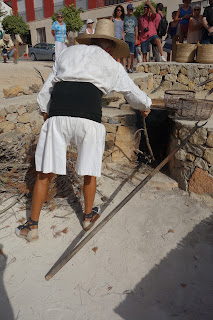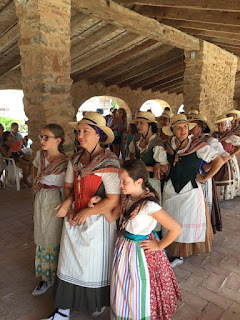 You don't need an alarm clock during the summer months in Jesus Pobre. It's odds on you'll be woken by the sounds of air exploding fire crackers at roughly 9am during fiesta season. The last Sunday of this August was no different - BANG! "Cup of coffee my dear?"
You don't need an alarm clock during the summer months in Jesus Pobre. It's odds on you'll be woken by the sounds of air exploding fire crackers at roughly 9am during fiesta season. The last Sunday of this August was no different - BANG! "Cup of coffee my dear?"That abrupt early morning call got me up and moving - I had a dog to walk; well, my daughter had asked me to walk hers the night before, time to see what this grape festival is all about.
The area around the Riurau was a hubbub of activity. Stalls were being erected, bar service was in full flow and there were many already seated and having their almuerzo (Mid-morning snack to my British readers). Many people were wearing the traditional dress of the mid-nineteenth century and the village was filling up with tourists. I dropped off the dog and went to see what it was all about.
This event is held on the last Sunday of August where the process by which the Muscat grapes (Moscatel in Spain) are transformed to raisins; called L'Escalda - The Scalding.
I researched the traditional process which begins with the grapes being transported in wicker baskets
 |
| Stoking up the fire under the kiln |
 |
| The arrival of the grapes - nice hats! |
were dunked into the herbaceous water to be washed.
Standing by were the women of the village. Their task, when the grapes were hauled out of the water onto bamboo pallets, was to ensure the grapes were separated enough to ensure they would all individually dry out. When a pallet was full of grapes it was the job of two strong men to
 |
| Bringing the herbaceous water to the boil |
 |
| Sorting the "scalded grapes" before they are set out to dry |
This was an event that mirrored the activities taking place on the very spot during 1873, the year the Riurau was built as a shelter to transfer the raisins to if it rained, preventing rot. It had been a living history lesson and a magnet for locals and tourists alike.. It was a jostle just to get a photograph.
 |
| The finished product being weighed on traditional scales |
To round off the morning's activity Colla La Xarteta, a troupe of traditional musicians, led a procession of the Jesus Pobre Dance Group into the Riurau to complete a closing ceremony. Traditional music and dance was performed to the delight of the camera clicking audience; meanwhile, in a corner were a group of ladies making traditional wicker baskets, another photo opportunity for the tourists.
 |
| The procession of the dancers |
The bars and restaurants of the town all benefited from the festival. Bar Pedro and Rosita swelled
their lunchtime bookings with a special three course menu of the day. We had a swift drink in Pedro's before wandering the few yards to Bar Rosita for our lunch. The staff in both places were in traditional dress to commemorate the day, it seems everyone in the village gets into the spirit of things. One of our courses was a Goats cheese salad with walnuts and raisins splashed with balsamic vinegar, an homage to the day, no doubt.
The objective of the morning's demonstration is probably to educate. I would differ, describing it as great entertainment; an occasion you should note in your diary for next year. To bring the day full circle, remember the dog? I volunteered to walk her again in the evening and on our usual route through the campo I saw a farmer harvesting his moscatel grapes - now, we all know what's going to happen to them.
 |
| "So ladies, is it Barcelona or Real Madrid this season?" |
 |
| A sea of drying grapes |
.
.
No comments:
Post a Comment